【牛津译林版】中考英语一轮复习教案:8上 Unit 5 Wild animals
牛津译林版-英语-八上-5单元 Wild animals task教案
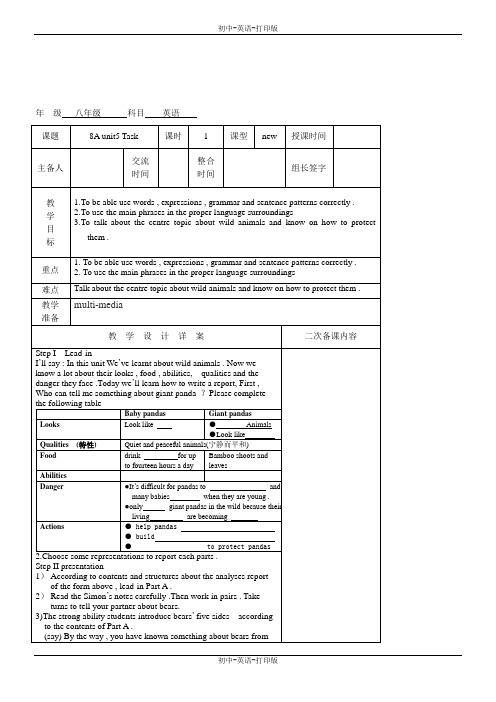
Paragraph5----Danger
2.Then I’ll go on saying:I think everyone must be interested in bears . Before you begin to write the wild animals in danger, you should master the frame/freim / n.框架and when you begin to write , you may use the useful expressions on page 66 . Let’s write the draft/dra: ft / (草稿) first.
4)Show student’s works
Step IV Sample writing (写作样品) / model essay/‘esei / (文章)
Step V Homework
作业设计
1.Rember all the new words , phrases and sentence patterns in this period .
教学设计详案
二次备课内容
Step I Lead-in
I’ll say : In this unit We’ve learnt about wild animals . Now we know a lot about their looks , food ,abilities, qualities and the danger they face .Today we’ll learn how to write a report, First , Who can tell me something about giant panda?Please complete the following table
牛津译林版-英语-八上-5单元 wild animal 教学课件
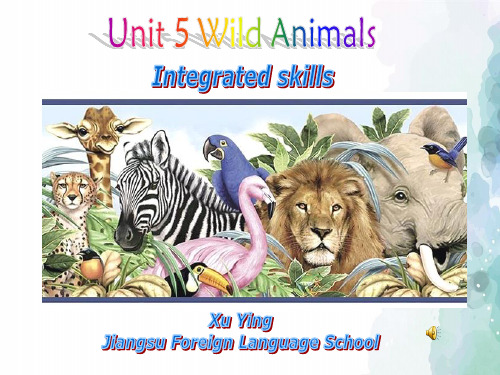
Appearance
Wolves
Food
• not very (6) ____ (large, big, small) • (7) _______ (grey, black, brown) fur (5-6 cm long)
Ying’s words for you
work as a team
ቤተ መጻሕፍቲ ባይዱ
Remember
have a great time learning English until the end of this lesson
What is the video about?
Brainstorming
zebras
Whales
Appearance the biggest in the sea Ability be good at diving Character
Food •small fish •ocean animals
Danger
•hunt them for their fat •dirty water
1.What do tigers look like? What can they do? Do they always live as a family? What do they eat? Why are they in danger?
2. What do wolves look like? Do they have good eyesight, hearing and smell? Are they friendly towards each other? Do they often attack people? What do they eat? Why are they in danger?
最新牛津译林初中八年级英语上册 Unit 5 Wild Animals Period 5 Grammar I教案
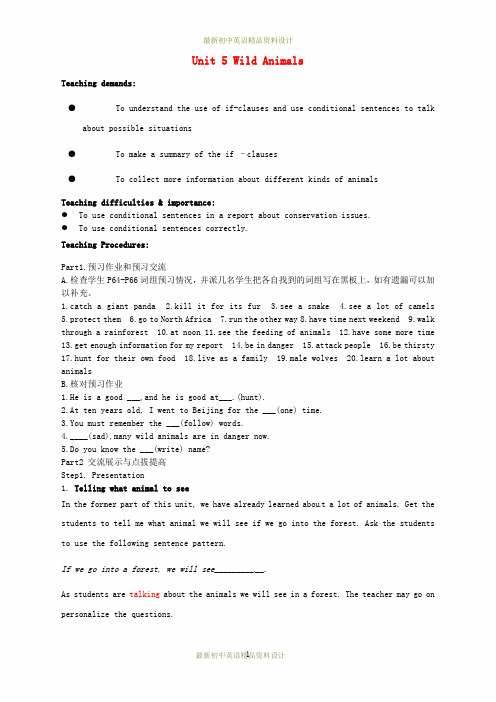
Unit 5 Wild AnimalsTeaching demands:● To understand the use of if-clauses and use conditional sentences to talkabout possible situations● To make a summary of the if –clauses● To collect more information about different kinds of animalsTeaching difficulties & importance:●To use conditional sentences in a report about conservation issues.●To use conditional sentences correctly.Teaching Procedures:Part1.预习作业和预习交流A.检查学生P64-P66词组预习情况,并派几名学生把各自找到的词组写在黑板上,如有遗漏可以加以补充。
1.catch a giant panda2.kill it for its fur3.see a snake4.see a lot of camels5.protect them6.go to North Africa7.run the other way8.have time next weekend9.walk through a rainforest 10.at noon 11.see the feeding of animals 12.have some more time 13.get enough information for my report 14.be in danger 15.attack people 16.be thirsty 17.hunt for their own food 18.live as a family 19.male wolves 20.learn a lot about animalsB.核对预习作业1.He is a good ___,and he is good at___.(hunt).2.At ten years old, I went to Beijing for the ___(one) time.3.You must remember the ___(follow) words.4.____(sad),many wild animals are in danger now.5.Do you know the ___(write) name?Part2 交流展示与点拔提高Step1. Presentation1. Telling what animal to seeIn the former part of this unit, we have already learned abou t a lot of animals. Get the students to tell me what animal we will see if we go into the forest. Ask the students to use the following sentence pattern.If we go into a forest, we will see___________.As students are talking about the animals we will see in a forest. The teacher may go on personalize the questions.In this way, the teacher may get the students to use conditional sentences fluently and accurately before coming to any rules. It will help the students to understand the rules of conditional sentences better. Write some of the sentences on the board and get the students to read them. Direct students’ attention to the tense us ed in the clauses. They may find that people use simple present tense with if-clauses, while simple future tense with the other clause. (让学生自己看着句子总结:主句用将来时,从句用现在时)。
牛津译林版-英语-八上-5单元 Wild animals Integrated Skills教案
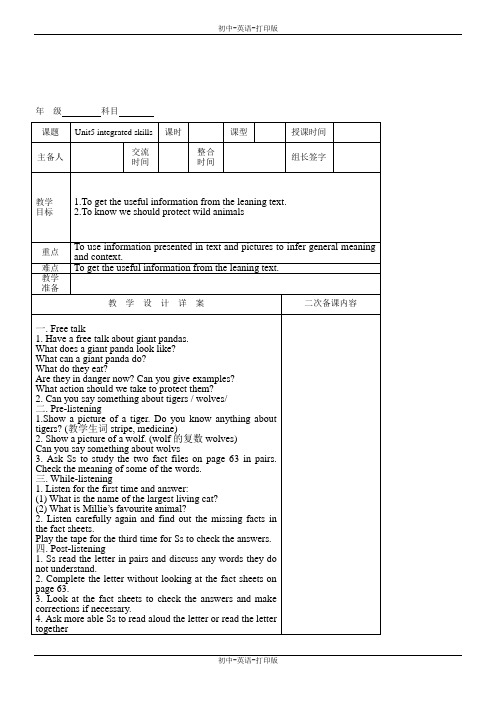
一. Free talk
1. Have a free talk about giant pandas.
What does a giant panda look like?
What can a giant panda do?
What do they eat?
Are they in danger now? Can you give examples?
年级科目
课题
Unit5 integrated skills
课时
课型
授课时间
主备人
交流
时间
整合
时间
组长签字
教学
目标
1.To get the useful information from the leaning text.
2.To know we should protect wild animals
3.make medicine4. befriendly towards each other
5. theloss of living areas6.make medicine from their bones
7.buy clothes made of animal fur8.look lovely on me
3.Ask students to create their own conversation using information from the fact sheets.
七. Language points
1.live as a family2.be good at hunting other animals
Play the tape for the third time for Ss to check the answers.
最新牛津译林版中学八年级英语上册 Unit 5 Wild animals Reading教案1
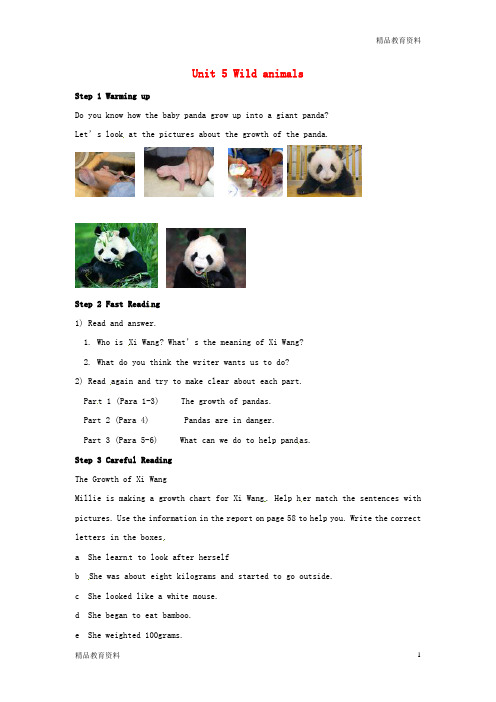
精品教育资料Unit 5 Wild animalsStep 1 Warming upDo you know how the baby panda grow up into a giant panda?Let’s look at the pictures about the growth of the panda.Step 2 Fast Readi ng1) Read and answer.1. Who is Xi Wang? What’s the meaning of Xi Wang?2. What do you think the writer wants us to do?2) Read again and try to make clear about each part.Par t 1 (Para 1-3) The growth of pandas.Part 2 (Para 4) Pandas are in danger.Part 3 (Para 5-6) What can we do to help pand as.Step 3 Careful ReadingThe Growth of Xi WangMillie is making a growth chart for Xi Wang. Help h er match the sentences with pictures. Use the information in the report on page 58 to help you. Write the correct letters in the boxes.a She learn t to look after herselfb She was about eight kilograms and started to go outside.c She looked like a white mouse.d She began to eat bamboo.e She weighted 100grams.精品教育资料f She weighed over 35 kilograms.Step 4 Pair workWhat problems may Xi Wang meet in the future?What can we do to save them?Step 5 ExercisesDo more exercises B, B 3 and B 4.Step 6 HomeworkRetell the story教学反思。
05牛津译林版 8A Unit 5 Wild animals语法知识点

8A Unit 5 Wild animals语法知识点讲解课文重点内容和语法知识1 about some wild animals 关于一些野生动物2 to use the new words to talk about a wild animal 使用新单词来谈论野生动物3 to use may for possibility 使用may来谈论可能性;to use verbs+to-infinitives 使用动词+不定式to4 the suffixes –ing, -ness, and –ion 后缀-ing,-ness,和-ion一、【重点短语】1. in the wild 在野外2. have/take pity on 同情,怜悯3. in fact 事实上4. look so cute 看起来如此可爱5. be born 出生,出世6. look like 看起来像7. at four months old 在4个月的时候8. not…any more 不再……9. in the beginning 一开始10. look after 照顾照看11. as a result 因此12. in danger 处于危险中13. take action 采取行动14. right away 马上,立刻15. build more panda reserves 建立更多的熊猫保护区16. make laws to protect pandas 颁布法律保护熊猫17. at birth 出生时诞生时三、【重点句型】1. They turned around but saw nothing.她们转过身去,可什么也没看到。
(1) turn around转身Jim turned around and saw his parents standing behind him. 吉姆转过身去,发现他的父母在他的身后。
牛津译林英语八(上)Unit 5 Wild animals welcome to the unit 公开课教学课件共52张PPT
— ______, I’ll be free then.
(2012浙江温州)
A. Sorry, I can’t B. Not at all
C. Thank you
D. Sure, I'd love to
2. Please have pity on them, Eddie. have pity on = take pity on 同情,怜悯 One should have pity on the beggar in the street. 一个人应该同情街上的乞讨者。
Human beings hunt them too much.
What do people kill them for?
fur & skin
tusk (象牙) meat
Step 7 Discussion:
1.Are the wild animals free and happy in the wild?
tiger(s)
Tigers are big and strong Tigers canrun fast. Tigers are the kings in the forest
dolphin(s)
live in the sea
can swim fast,play some tricks clever ,friendly to people
They cannot find enough food.
The forest has been destroyed (被毁). Their habitat (栖息地) is being threatened (受到威胁的).
They are killed by the environmental pollution (环境污染).
牛津译林版英语八上Unit5《Wildanimals》(integratedskills)说课稿
牛津译林版英语八上Unit 5《Wild animals》(integrated skills)说课稿一. 教材分析《牛津译林版英语八上Unit 5 Wild animals》主要介绍了一些野生动物,包括老虎、狮子、熊、猴子等。
本单元以动物为主题,通过学习动物的特点、生活习性以及保护动物的重要性,提高学生对野生动物的认识和关注。
本节课为单元的Integrated Skills部分,主要通过听力、口语、阅读和写作等多种形式,让学生综合运用本单元所学知识。
二. 学情分析八年级的学生已经具备了一定的英语基础,对于一些基本的词汇和句型能够熟练掌握。
但是,对于一些较为复杂的动物特点和保护动物的观点表达,还需要进一步引导和培养。
因此,在教学过程中,需要关注学生的个体差异,针对不同水平的学生给予适当的辅导和激励。
三. 说教学目标1.知识目标:学生能够掌握本节课所学的词汇和句型,了解各种野生动物的特点和生活习性。
2.能力目标:学生能够听懂、会说、会读、会写关于野生动物的短文,提高学生的综合语言运用能力。
3.情感目标:学生能够认识到保护动物的重要性,培养关爱动物的情感。
四. 说教学重难点1.重点:学生能够掌握本节课所学的词汇和句型,运用所学知识进行口语交流和写作表达。
2.难点:学生能够正确使用一般现在时描述动物的特点和生活习性,以及表达保护动物的观点。
五. 说教学方法与手段1.任务型教学法:通过设置各种任务,激发学生的学习兴趣,提高学生的参与度和积极性。
2.情境教学法:创设生动、真实的情境,帮助学生理解动物的特点和生活习性。
3.合作学习法:鼓励学生分组讨论、合作完成任务,培养学生的团队协作能力。
4.多媒体教学手段:利用多媒体课件和视频,丰富教学内容,提高学生的学习兴趣。
六. 说教学过程1.导入:通过展示一些野生动物的图片,引导学生谈论自己喜欢的动物,从而引入本节课的主题。
2.展示:教师通过多媒体课件,展示本节课所学的词汇和句型,让学生初步感知和理解。
译林版八年级英语上册Unit5Wildanimals!(全章教案)
译林版八年级英语上册Unit 5 Wildanimals全章教案第1课时Comic strip and Welcome to the unit一、教学目标1. 95% students learn to master the new words and some sentence patterns;2. 90% students talk about wild animals from two aspects: characteristics and appearance;二、教学重点To let students talk about favourite animals and give reasons.三、教学难点To let students talk about favourite animals and give reasons.四、教学过程(一)Lead-in(W elcome to the unit)T: We know there are many lovely pets around us, such as dogs, cats, goldfish, rabbits, tortoises and so on. If you get one or two of them as pets, will you look after them well? I believe you can take good care of your pets. However, many other animals also need your care. They don’t live in our house. They are wild animals and some of them live in the wild. (Board-writing: wild) Would you like to go to the forest and visit them?S: Y es.T: We are strangers in the forest, so wild animals are shy and afraid to see us. Some of them hide(二)Presentation1. Present the names of wild animals(1) Show more pictures of wild animalsT: They are wild animals and they can’t speak like us. Can you help them introduce themselves? Y ou can make the self-introduction just like this. Hello! My name is … I am … I can …(2) Read the names of the wild animals after the teacherAsk the students to read these new words and phrases after the teacher for three times. Make sure all the students can read the names correctly. Then do Part A on page 57.(3) Finish Part A on page 57(4) Play a guessing gameT: Wild animals are our friends. It’s important to protect wild animals. Let’s check how much you know about wild animals. Let’s play a guessing game. Write the names on pieces of paper and then invite some students to choose and say something of the animals (To make it easier, ask the students to use the first person). The other students should listen carefully and guess what animal it is.Bear: I’m very big and strong. I like eating fish.Zebra: I look like a horse and can run fast. I have black-white stripes.Squirrel: I am small but lovely. I have a very big tail. I like eating nuts (坚果).Giant Panda: I am cute and I live in China. I hope that one day I can take a colour photo.Dolphin: I’m friendly and clever. I like playing balls and dancing in the sea. Who am I?Tiger: I’m the King of our forest. I’m dangerous. Don’t attack (攻击) me!2. Present the dialogue(1) Read the dialogue and answer the question.T: Millie and her classmates are talking about their favourite wild animals. Let’s listen to t heir conversation and then try to answer the question: What’s Simon’s favourite wild animal? (Play the recording of part B)S: He likes lions best.(2) Get the students to read the dialogue carefully and complete the table.(3) Get the students to read the dialogue together or in roles.(4)Get the students to make up dialogues.T: We have learned many kindsof wild animals. Can you tellme which wild animal you likebest and which one you likeleast? Then get the students totalk about their favourite wildanimals.(三)PracticeUse the following model tomake dialogue.A: Which animal do you like best?B: I like … best.A: Why?B: Because they are …A: Which animal do you like least?B: I like … least.A: Why?B: Because they are …(四)Lead-in(Comic strip)1. Look at the picture and answer the questionsT: Look at the picture. We all know him. He is our old friend Eddie. Is Eddie a wild animal?S: No. Because he doesn’t need to look for food in the wild.T: Well, Hobo and Eddie are talking about wild animals. Now let’s watch a short flash about their dialogue and try to answer the questions:(1) Will Eddie eat the wild animals? Why or why not?(2) Will Eddie eat the wild animal? Why or why not?2. Play the flash for them and then get some students to answer the question(五)Practice1. Play the tape again and get the students to read after it. Then ask them to fill in the blanks.T: Please listen to the tape again and repeat in groups, paying attention to the pronunciation and intonation.2.Work in pairs and read the dialogue in roles.(六)ConsolidationDivide the students into two groups: boy group and girl group. Boy group’s opinion: People can eat wild animals. Girl group’s opinion: People shouldn’t eat wild ani mals. They are given several minutes to prepare for the debate.(七)SummaryT: Wild animals are our friends. We shouldn’t eat or kill them. We should love and protect them. We should share the world with them!(八)Homework1. Finish some exercises of this period;2. Find more information about giant pandas;3. Preview Reading五、教学反思第2课时Reading(1)一、教学目标1. 95% students learn to get specific information by using the indicating words;2. 90% students to understand the understand the importance of protecting wild animals.二、教学重点To let students know the background of different wild animals in the world and talk about them 三、教学难点To let students know the background of different wild animals in the world and talk about them 四、教学过程(一)Lead-inEnjoy a video about Kungfu Panda II.T: Today, we’ll continue to learn about wild animals. First, let’s enjoy a video.T: As we can see, the panda in the film is very good at kungfu and it lives happily. But it is very difficult for real pandas to survive in the wild. They need our help, right? In fact, there are a lot of things that we can do to care about the pandas. We can join the WWF. We can design a leaflet to ask people to help the pandas. So, let’s think about how to design a leaflet. I am sure that you will know how to design it after learning this report on the baby panda Xi Wang.(二)Presentation1. Learn the new expressions(1) B rainstorm T: What do you know about giant pandas?(2) Present the new expressionsT: Most of you know that the giant pandas live mainly on bamboo. And you also know that the number of giant pandas is very small because they are facing serious problems. They are in danger. Shall we take action to protect them? (Show some pictures with the words: live mainly on, face serious problems, be in danger and take action right away.)T: In fact, there a re a lot of facts about giant pandas that you don’t know. In the arti cle, The Story of Xi Wang, you find them and think you will know how to protect them after reading it.2. Skim for the main idea of the whole text(1) Watch a video of the text and skim for the main idea of the articleT: First, let’s watch a video to get a general idea of the text.T: Can you find an easy way to get the main idea of the article quickly? (Group work)T: Sometimes, we can get the main idea of the whole article from the title, the pictures and the first and last paragraph.(2) Have a tryT: Let’s have a challenge to get the main idea of the text.3. Skim for the main idea of each paragraph(1) BrainstormT: The report is about the pandas, so let’s guess in what aspects we can introduce the pandas. We will use the mind map to help us. Here, I will give you a sample of the mind map.(2) Skim for the main ideas of paragraph 2 to 5T: All of you have thought of so many ideas. Now, let’s read paragraph 2-5 and find their main ideas to see whether you have made the right prediction.(3) Explain how to find out the main idea with the topic sentence.T: Here, I have a question for you. How did you find the main idea of paragraph 4? Can you circle the topic sentence?4. Understand the structure of the textT: So far, we have known how the report is organized. It is time for us to analyze the structure of the report. How many parts can the report be divided into? What are they? Please work in groups.5. Scanning for the specific information.(1) Finish the table.T: Boys and girls ,we have known the structure of this article and the main idea of each paragraph. Now, let’s get a close look at the article. First, let’s find out what the pandas eat and how much they weigh in different stages. Y ou can circle some useful words while looking for answers. Now, please listen to the tape and then finish the table.Information about Xiwang(2) DiscussionT: While looking for the answers, you may find some useful words that can help you quicklyfind the information you need. Can you circle them?(3) Scanning for the specific informationT: Next, let’s find out what problems the pandas face and what actions we can take. Y ou can circle some useful words while looking for answers.(4) Have a tryT: Let’s have a challenge to use the indicating words to find the answers.6.SummaryT: Now we have a better understanding of the text. Let’s review what we learnt.(三)Consolidation1. Retell the textT: Boys and girls, so far, we have learnt a lot of details about giant pandas. I think we can tell our friends or someone else about this lovely wild animal. Let’s retell the story. Here are some useful expressions for you.look like a white mouse weigh just 100 gramsat four months oldeightmonthslater not … any morein the beginninglook after herselfface serious problemsit is difficult for … to …live mainly on become smaller and smalleras a resultbe in danger take action2. Finish a leafletT: We need to take action to help them right now. Please design a leaflet to ask people to care about giant pandas. Here are some useful expressions.… be born in the beginning when … Sadly …for example …Also... in danger take action3.SummaryT: No buying, no killing!(五)Homework1. Search the internet to find out more ways to protect wild animals;2. Finish the paper.五、当堂检测The baby panda called Xi Wang weighed just 100 grams at______and looked______a white mouse.At four months old,she began to go outside for the ______time.Eight months later,she weighed______35kilograms.In the beginning, Xi Wang drank her mother’s milk.When she was six months old,she began to eat______.When she was 20 months old,she learnt to look after______.Sadly,giant pandas face serious problems in the________.For example,it is very difficult for pandas to have_______,and many baby pandas die when they are very young.Also,giant pandas live______on a special kind of bamboo.However,the bamboo_______are becoming smaller and smaller.As a result,pandas may not have a place to live or ______to eat.Giant pandas are now in _____.We should take action right away.We can help pandas have ______babies,build more panda reserves or make ______to protect pandas.There are now only about 1,600 pandas in the wild.If we do nothing,______there may be none left!Keys:1.birth 2.like 3.first 4.over 5.bamboo 6.herself 7.wild 8.babies9.mainly 10.forests 11.food 12.danger 13.more ws 15.soon六、教学反思第3课时Reading(2)一、教学目标1. 100% students can have a deeper understanding of the report;2. 90% student can use the new words and phrases properly;3. 85% students learn to rewrite the report in the perspective of Xi Wang.二、教学重点To let students have a deeper understanding of the report;三、教学难点To let students have a deeper understanding of the report;四、教学过程(一)Revision1. Have a revision of the basic information about giant pandasT: Hello, everyone! We have learnt a story about a baby panda called Xi Wang. In today’s lesson, we will have a revision of the story and learn something useful from the story. First, I want to know how much you know about Xi Wang. Please answer the following questions.(1) What did she look like when she was born?(2) What could she do when she was 4 months old?(3) What do pandas eat when they grow up?2. Have a revision of the problems that giant pandas face and the actions that we can take to protect them.(二)Practice1. ExercisesT: Now, let’s have a challenge to see whether you can use the new language points in exams.(1) Fill in the blanks with the correct forms of the words in the brackets.a. Although she _________ (bear) in America, she spent her childhood in China. (was bo rn)b. When the sun appeared in the east, the sky starts ________ (get) brighter and brighter. (toget)c. People in North China _________ (main) on wheat. (mainly)d. Sanjiangyuan is one of the biggest nature ________ (自然保护区) in the world. (reserves)e. We should not do something against the _________ (法律) in the protected areas. (laws)(2) Translate the following sentences into Englisha. 现在大多数野生动物都面临严重的问题。
最新牛津译林版八年级英语上册 Unit 5 Wild animals Reading 1教案
精品教育资料Unit5 Wild animalsTeaching aims:To understand the meaning of the report to finish the exercises prepared for you correctly.Focus and difficult points:T o understand the meaning of the report .Teaching tools : PPTTeaching procedure:Step1. Show teachin g aims. (1')Step2. Read and understand the story correctly .Show Guide One1.Read quickly the report and choose the correct answers.(4)( ) (1). What wild animal did it say in the report?A. A giant panda.B. A white mouse.C. A giant panda called Xi Wang.D. A baby panda.( ) (2).What is the main meaning of the report?A. It said that a panda called Xi Wang.B. It advised us to take action to protect the giant pandas by telling the story of Xi Wang.2. Read the first passage to the fourth passage and answer the following questions.(4')(1).How much did Xi Wang weigh when she was born?(2).What did Xi Wang start to do when she was four months old?(3).What did Xi Wang live on in the beginning?(4).When did Xi Wang learn to look after herself?3. Read the last passages and answer the following questions.(5')(1).What serious problems do giant pandas face in the wild now?(2).What actions should we take to protect giant pandas?(3).Do you believe that where there is Xi Wang, there is hope?Step3. Understand and use correctly.Show Guide Three1. Millie is making a growth chart for Xi Wang. Help her match the sent ences with the pictures. Use the information in the report on page 58 to help you. Write the correct letters in the boxes.Finish Part B2 on Page 59.(5')2.Listen and find the words and phrases in Part B1.(3')Do you understand them ?Finish Part B1 on Page 59.(2')3.Read the report aloud and understand further the report in group.(6')(1). F inish the exercise(二) on Page 47(课课练)(5')精品教育资料Practice in classComplete Part B3, B4 on Page 60.(8')教学反思:。
- 1、下载文档前请自行甄别文档内容的完整性,平台不提供额外的编辑、内容补充、找答案等附加服务。
- 2、"仅部分预览"的文档,不可在线预览部分如存在完整性等问题,可反馈申请退款(可完整预览的文档不适用该条件!)。
- 3、如文档侵犯您的权益,请联系客服反馈,我们会尽快为您处理(人工客服工作时间:9:00-18:30)。
匠心文档,专属精品。 匠心教育系列 - 1 -
八上 Unit 5 Wild animals 一、复习单词 A、拼读易错的单词 wild, giant panda, beginning, serious, mainly, result, thick, shame, accept, tail. B、重点单词用法 1、dish (pl.) __________________ quality (pl.) __________________ catch (三单)______________(过去式、过去分词)__________________ wolf (pl.) __________________ human (pl.) __________________ slowly (比较级、最高级)______________________________ 2、free ①(adj.) 自由的,不受束缚的 Students have a ___________ (not under the control or in the power of sb else) choice of courses in their final year. I tried to pull one hand f__________ and finally managed to break the ropes. ②(adj.) 有空的,空闲的 be free = have time 有空 in one’s free time 在某人的空闲时间 ③(adj.) 免费的 Come to the robot show on 14 March and you can receive a copy of Robot magazine for _______________ (costing nothing). 3、die (vi) 死 (三单)_____________(现在分词)______________ (过去式)___________(过去分词)______________ In the 1960s, many Chinese ________________________(死于饥饿) dead (adj.) 死的,失去生命的 His mother is _________. She _______ in 1987. (die) When autumn comes, many _________ leaves fall onto the ground. (die) In the film, a wealthy doctor is found _________ in his house. (die) dying (adj.) 临死的,垂死的 The doctor are trying to save the ___________ man. (die) death (n.) 死,死亡 He has decided to donate his body for medical research after his ________. (die) The victim was wounded with a knife and bled to _________ as a result. (die) be dead (持续性动词) The computer engineer ____________ for 6 hours. (die) The computer engineer __________ last night. (die) His ________ body was found in West Town. (die) The computer engineer ___________ already. (die) The computer engineer ____________ since last night. (die) It is 6 hours since the computer engineer __________. (die) The computer engineer’s ___________ made us all sad. (die) 匠心文档,专属精品。 匠心教育系列 - 2 -
4、mean (vt.) 意思是, 意味着 What _______ this sentence __________? It ___________ “Thanks”. (mean) meaning (n.) 意思,意义 What is the __________ of this sentence? Its __________ is “Thanks”. (mean) A word usually has several ___________. (mean) meaningful (adj.) 意味深长的,有意义的 She does not have as much money as before, but she thinks her life is _________________ (mean). It is ____________ to work as volunteers at community centres or in libraries at the weekend. (mean) meaningless (adj.) 无意义的 We fill our lives with _____________ tasks. We feel boring. (mean) 5、sadly (adv.) 令人遗憾地,不幸地,伤心地 ________, giant pandas face serious problems in the wild. (sad) He cried ________________ than anyone else. (sad) _______, Pierre was not there to share the joy with her. (sad) She looked ________________ at her broken bike. (sad) sad (adj.) 难过的 (sad -sadder – saddest) She looked ______ . (sad) I felt terribly ________ about it. (sad) The news made them much ___________. (sad) This is one of the ___________ stories that I have ever heard. (sad) We are sad ________ (hear) that you are leaving. sadness (n.) 悲哀,忧伤 Blue represents calm and __________. (sad) 6、serious (adj.) 严重的,严肃的,认真的 (serious - more serious - most serious) be serious about … 对……认真 My job is much __________________ than you thought. (serious) Yao Ming did not become serious a________ basketball until he was 12. seriously (adv.) 严重的,严肃的,认真的 Smoking can _____________ harm your health. (serious) 7、mainly (adv.) 主要地, 大部分地 Giant pandas live _____________ on a special kind of bamboo. (main) People in India __________ speak Hindi. (main) main (adj.) 主要的,最重要的 Rice and wheat are their _________ crops. (main) 8、danger (n.) 危险 (反义词)______________ be in danger 处境危险 face much danger 面临许多危险 In war a soldier’s life is full of ________________ (danger). Can you think of any _________ (safe) tips to protect yourselves against crime? 匠心文档,专属精品。 匠心教育系列 - 3 -
dangerous (adj.) 危险的 (反义词)_____________ more and more dangerous 越来越危险 Fire can be _____________ if we are not careful with it. (danger) We’d better not go out alone at night either. It can be ___________. (danger) I think we need to guard against any possible _________ around us. (danger) 9、closed (adj.) 关闭的 (反义词)____________ The airport ____________ for a long time. It is much quieter than before. (close) It is cold outside. Please keep the door and the windows ______________. (close) The sleeping horse is standing with its eyes ____________. (close) Fish can sleep with its eyes _______________. (open) close (vt.) 关闭 (反义词)___________ The airport ___________ a long time ago. It is much quieter than before. (close) The shop ___________ at 9:00 p.m. every day. (close) close (adj.) 近的;亲密的 (close – closer – closest) 密切地 be close to … 离……近 sit/live close to … 离……坐/住得近 work closely with … 与……密切地合作 They sat much __________ to each other, talking quietly. (近地) British people only greet relatives or _________ friends with a kiss. (亲密的) It’s great for us to work ________ with these special athletes. (密切地) I don’t have any __________ friends to talk to. Sometimes I feel lonely. (close) Hepburn spent her last few years working ____________ with UNICEF. (close) This one-hour documentary takes a _____ look at the life of tigers in India. (close) 10、lost (adj.) 迷路的,迷失的 = missing get lost = lose one’s way 迷路 Unless you have a map, you will get ______ easily. (lose) The police are searching the mountain for the ______ child. (lose) lose 失去,被 夺去;输掉 (lose - lost – lost ) lose heart 泄气,灰心 Many of the Chinese paintings _______________ in the past few years. (lose) The museum ________________ many of the Chinese paintings in the past few years. (lose) Many wild animals are afraid of _______ their living areas. (lose)
